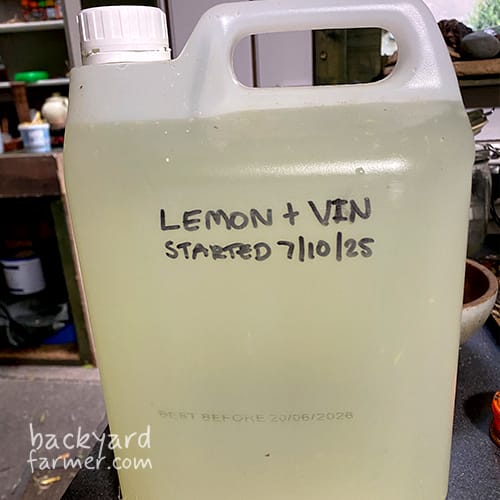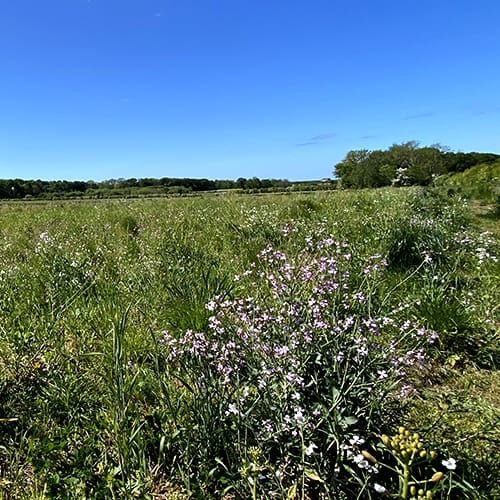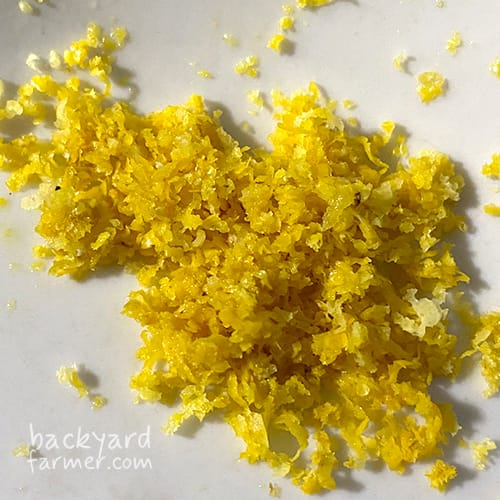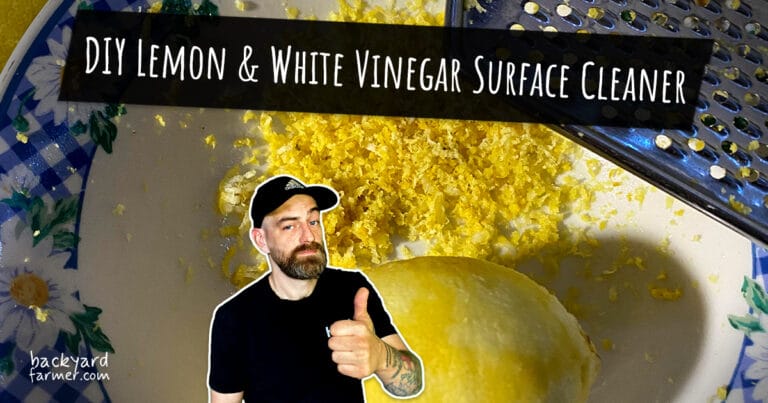Introduction: Why Go Natural?
More people than ever are choosing the lemon and white vinegar cleaner and other natural cleaning products — not just for the planet, but for their own wellbeing. After years of using chemical-heavy sprays and single-use plastic bottles, many households are discovering that simple ingredients like lemon and white vinegar can clean just as effectively — and often better.
Everyday staples such as lemon and vinegar easily tackle grease, grime, and germs without leaving behind harsh residues or synthetic fragrances. They’re affordable, easy to make, and safe to use throughout the home — from kitchen worktops to bathroom tiles.

Meet the Lemon & White Vinegar Cleaner
This lemon and white vinegar cleaner is one of the easiest and most effective homemade kitchen cleaners you can make. It’s eco-friendly, affordable, and endlessly reusable — proving that natural cleaning doesn’t have to be complicated. Why you’ll love it:
- Made with natural, non-toxic ingredients
- Cuts through grease and soap scum with ease
- Leaves a fresh citrus scent without synthetic chemicals
Whether you’re cleaning the kitchen, brightening the bathroom, or wiping down everyday surfaces, this DIY lemon and vinegar cleaner delivers sparkling results without harming your health or the environment.
What You’ll Learn in This Guide
Here’s what this guide covers:
- Why vinegar and lemon make such a powerful natural cleaning duo.
- How to infuse and mix them for the perfect balance of scent and cleaning strength.
- The best ways to use your homemade spray around the home.
This simple switch helps you save money, reduce plastic waste, and enjoy a home that’s cleaner, greener, and naturally fresh — one spray at a time.
Why Switch to Natural Cleaning
Walk down any supermarket cleaning aisle and you’ll see rows of brightly packaged sprays promising instant shine and antibacterial power. But behind those labels, most contain synthetic chemicals, artificial scents, and single-use plastic packaging. Switching to natural cleaning products like a lemon and white vinegar cleaner is an easy, affordable way to create a healthier home — one that’s safer for your family and kinder to the planet.

Healthier for You and Your Home
Many commercial cleaners use harsh detergents and chemical fragrances that can irritate skin, trigger allergies, and reduce indoor air quality. In contrast, natural lemon vinegar cleaners are gentle but powerful, cutting through grease, grime, and odours without leaving behind toxic fumes. The result is a clean, fresh-smelling home that feels healthier and more inviting.

Kinder to the Planet
When you make your own eco-friendly cleaning products, you instantly reduce plastic waste and carbon emissions. By reusing spray bottles and buying white vinegar in bulk, you skip unnecessary additives and packaging. There’s no need for microplastics, phosphates, or synthetic preservatives — just biodegradable ingredients that safely return to the environment.

Saves Money Without Sacrificing Results
A bottle of vinegar and a few lemons cost far less than branded cleaning sprays — yet they deliver equal or even better results. You can make litres of homemade kitchen cleaner for the same price as one store-bought bottle. Over time, those small savings really add up, keeping both your home and your wallet in great shape.

A Simpler, Sustainable Cleaning Routine
With just a few natural ingredients, you can replace half the cleaning bottles under your sink. It’s a small but powerful step toward a low-waste, sustainable lifestyle, giving you complete control over what’s used in your home and around your family.
For more eco-friendly cleaning ideas, visit How to Make Eco-Friendly Cleaning Products.
The Power of Lemon and Vinegar
Lemon and vinegar are two of nature’s most effective natural cleaning ingredients. When combined, they create an incredibly powerful lemon and white vinegar cleaner that can tackle dirt, grease, and odours with ease. Each one brings something unique to the mix — vinegar cuts through grime, while lemon adds natural antibacterial properties and a bright, fresh scent. Together, they form a gentle yet powerful homemade kitchen cleaner that leaves your home sparkling — without harsh chemicals.
According to Healthline, vinegar’s natural acidity makes it a powerful cleaner for dissolving grease, mineral deposits, and soap scum without relying on harsh chemicals.
Why Vinegar Works
White vinegar is made through natural fermentation and contains acetic acid, the secret to its cleaning strength. This mild acid breaks down grease, dissolves mineral deposits, and neutralises odours — all in one go. Because it’s non-toxic and biodegradable, vinegar makes an excellent eco-friendly alternative to synthetic sprays.
Vinegar cleaning benefits:
- Cuts through grease and everyday grime
- Removes limescale, soap scum, and water marks
- Neutralises odours naturally
- Safe for most sealed, hard surfaces
Why Lemon Adds Extra Power
Lemons take your natural surface cleaner to the next level. Packed with citric acid and limonene, they boost vinegar’s degreasing and deodorising power. The natural oils in lemon peel soften vinegar’s sharp scent, leaving behind a clean, uplifting citrus fragrance. It’s perfect for kitchens, bathrooms, and anywhere you want a fresh, chemical-free shine.

Lemon cleaning benefits:
- Naturally antibacterial and antifungal
- Enhances degreasing and stain removal
- Adds a refreshing citrus aroma
- Provides mild natural preservation
Why Unwaxed Lemons Are Best
Always choose unwaxed lemons when making your lemon vinegar cleaning spray. The wax coating found on regular lemons can block essential oil release and make the vinegar cloudy. If you only have waxed lemons, rinse them in hot water and scrub gently with baking soda or vinegar to remove the coating before zesting.
Together, lemon and white vinegar create a powerful, sustainable cleaning solution that’s tough on dirt but gentle on your home and the planet. It’s proof that simple, natural ingredients can easily outperform even the most expensive store-bought cleaners.
DIY Lemon & White Vinegar Cleaner Recipe
This easy recipe makes a versatile, all-purpose natural cleaner that’s ideal for everyday use. By infusing lemon and white vinegar, you’ll create a golden, citrus-scented concentrate that cuts through grease, removes grime, and leaves your home sparkling — all without harsh chemicals or artificial fragrances.

Ingredients
- 1 × 5 L bottle of distilled white vinegar
- 4–7 unwaxed lemons (use zest and a little pith for natural antibacterial power)
- Filtered or cooled boiled water (for dilution)
- (Optional) 10–15 drops of lemon, sweet orange, or eucalyptus essential oil
- Muslin cloth or fine strainer
- Glass spray bottle for storage
How to Make Your Own Eco Surface Spray (Step by Step)
1. Prepare the Lemons
Wash the lemons thoroughly — unwaxed and organic if possible. Peel the zest and include a little of the white pith for its natural antibacterial and degreasing properties. Avoid the juicy pulp to keep your cleaner shelf-stable and clear.
2. Infuse the Vinegar
Add the lemon zest and pith to the 5 L bottle of white vinegar for cleaning. Seal it tightly and store it in a cool, dark cupboard for 3–4 weeks. Give the bottle a shake every few days to help release the natural citrus oils and deepen the scent.
3. Strain the Concentrate
After a few weeks, strain the mixture through a muslin cloth or fine sieve to remove solids. You’ll be left with a clear, lemon-infused vinegar concentrate that’s both powerful and naturally antibacterial.
4. Dilute for Use
Mix 30% lemon vinegar concentrate with 70% filtered or cooled boiled water in your glass spray bottle. For a stronger scent, add a few drops of essential oil such as lemon or eucalyptus. Label the bottle clearly and store it away from direct sunlight.
5. Clean Away
Spray directly onto surfaces, wait about 30 seconds, and wipe clean with a cloth. This lemon vinegar cleaner works perfectly on kitchen worktops, sinks, taps, mirrors, and tiles. However, avoid using it on marble, granite, or unsealed wood, as acids can damage porous surfaces.
💡 Tips for Best Results
- The vinegar smell fades quickly once dry, leaving a light, citrus scent.
- Let the infusion steep for up to 4 weeks for a softer, more balanced fragrance.
- Always spot-test before using on new or delicate surfaces.
- Make a new batch every 2–3 months for the freshest results.
⚠️ Note: While lemon and vinegar are naturally antibacterial, they’re not certified disinfectants. For food preparation areas or raw meat contact surfaces, use a food-safe sanitiser afterward for added safety.
How and Where to Use It
Your homemade lemon and white vinegar cleaner is a true all-rounder — safe, effective, and simple to use. The mild acidity of vinegar and the natural citrus oils from lemon work together to lift grease, dissolve soap scum, and leave behind a streak-free shine. Once you start using this DIY lemon vinegar cleaning spray, you’ll wonder why you ever needed shelves full of chemical products.
🏡 In the Kitchen
- Worktops and surfaces: Spray and wipe to remove crumbs, grease, and water marks. Ideal for laminate, tile, and sealed wood.
- Sinks and taps: Breaks down limescale and restores a natural shine. For tougher marks, let your lemon vinegar cleaner sit for a minute before wiping.
- Fridge and microwave: Removes odours and food residue safely. Spray onto a cloth rather than directly onto surfaces for a gentle clean.
- Bins and draining boards: Neutralises odours and refreshes surfaces naturally using the power of lemon and vinegar.
💡 Tip: Sprinkle a little bicarbonate of soda into the sink before spraying to boost deodorising power — it reacts gently with vinegar for extra cleaning action.
🚿 In the Bathroom
- Taps and tiles: Dissolves soap scum and hard water marks without scratching.
- Glass and mirrors: Lightly mist your natural lemon vinegar spray, then buff with a dry microfibre cloth for a streak-free finish.
- Toilet exterior and floor tiles: Cleans gently and leaves behind a subtle, refreshing citrus scent.
⚠️ Avoid using your vinegar cleaner on natural stone such as marble or granite, unsealed wood, or electronic screens. The mild acid can damage porous or sensitive surfaces over time.
🧽 Everyday Touch-Ups
Keep a small bottle of this natural lemon and vinegar cleaner handy for quick cleanups — from sticky kitchen spills to bathroom touch-ups. Because it’s made with eco-friendly, non-toxic ingredients, you can use it daily without worrying about residue or harsh fumes.
For more eco-friendly cleaning products and household swaps, visit Best Eco Washing-Up Liquid (UK).
Customising Your Lemon & White Vinegar Cleaner
One of the best things about making your own lemon and white vinegar cleaner is how easy it is to customise. Whether you want a softer scent, extra cleaning strength, or simply enjoy experimenting with natural cleaning products, this flexible recipe can be adjusted to fit your preferences perfectly.
🌿 Adjusting the Strength
If the vinegar scent feels a bit too strong, there are a few simple ways to balance it naturally:
- Infuse longer: Let the mixture steep for 3–4 weeks instead of 2. The extra time allows more lemon oils and natural compounds to infuse, softening the acidity and enhancing the scent.
- Add extra zest: Use an additional 2–3 lemons’ worth of zest per 5 L bottle for a stronger, fresher citrus aroma in your lemon vinegar cleaner.
- Add essential oils: Mix in 10–15 drops of lemon, sweet orange, or eucalyptus essential oil during dilution. This not only boosts the scent but adds a mild antibacterial lift.
⚠️ Tip: Avoid increasing the vinegar concentration beyond 50% in your ready-to-use spray. Too much acid can irritate skin and damage some surfaces.
🍋 Experimenting with Essential Oils
Essential oils do more than just improve fragrance — they also enhance cleaning performance. Try these natural combinations for your DIY lemon vinegar cleaner:
- Lemon or orange oil: Uplifting, fresh, and excellent at cutting through grease.
- Eucalyptus oil: Crisp, refreshing, and naturally antibacterial — perfect for bathrooms.
- Lavender or rosemary oil: Calming, earthy scents that create a relaxed, clean atmosphere.
Always shake your bottle before spraying so the oils stay evenly distributed. Stick with pure, natural essential oils rather than synthetic ones for the best results.
Optional Add-Ins for Extra Cleaning Power
To make your homemade kitchen cleaner even more effective, pair it with a few eco-friendly cleaning helpers:
- Bicarbonate of soda: A gentle abrasive that’s ideal for sinks, hobs, and stubborn grime.
- Castile soap: Add a few drops for heavy-duty degreasing — but don’t mix it directly into the spray bottle.
- Reusable microfibre or bamboo cloths: Great for streak-free results and a zero-waste cleaning routine.
A little experimentation goes a long way. Once you’ve refined your lemon vinegar cleaning spray, you’ll find it replaces nearly every commercial cleaner in your home — naturally, affordably, and effectively.
Cost and Environmental Comparison
Switching to a homemade lemon and white vinegar cleaner isn’t just good for your home — it’s also a smart move for your wallet and the planet. This simple DIY kitchen cleaner costs pennies per use and helps reduce plastic waste with every refill. It’s one of the most cost-effective and eco-friendly natural cleaning products you can make.
Cost Savings
Most branded eco-friendly cleaning sprays cost between £3–£5 per 500ml, which adds up quickly. In comparison, this DIY lemon vinegar cleaner can be made for under £1 per litre, even when factoring in reusable bottles and a few drops of essential oils.
Typical costs:
- White vinegar (5L): £3–£5
- Lemons (6–7): about £2
- Essential oils (optional): only a few pence per batch
Once you’ve stocked up on the basics, each refill costs next to nothing. You’ll reuse the same bottles over and over, saving both money and waste. Over time, these small savings make a big difference for your household budget and your eco goals.
Environmental Impact
Homemade natural surface cleaners like this one have a major positive impact on waste reduction. By refilling your own bottles, you eliminate the constant cycle of single-use plastics. Plus, this lemon and vinegar cleaner contains only biodegradable ingredients, meaning there’s no risk of chemical pollution when rinsed away.
Environmental benefits include:
- Fewer single-use plastic bottles in your home
- Lower carbon footprint thanks to reduced shipping and packaging
- No phosphates, parabens, or synthetic additives
- Safe, biodegradable disposal that won’t harm waterways
💡 Tip: Buy white vinegar in bulk or from local refill shops to cut packaging even further. Pair your eco-friendly cleaner with glass spray bottles and reusable microfibre cloths for a fully zero-waste cleaning setup.
For more low-waste household swaps and eco-friendly cleaning solutions, visit Best Eco Washing-Up Liquid (UK).
Optional Add-Ons and Eco Kit
If you’re ready to elevate your natural cleaning routine, building a small eco cleaning kit is the perfect next step. It makes everyday cleaning quicker, easier, and far more sustainable. Once you’ve got the essentials, they’ll last for years — saving you money and reducing waste. These affordable tools pair beautifully with your lemon and white vinegar cleaner, helping you maintain a clean, chemical-free home with minimal effort.
Recommended Tools and Supplies
- White Vinegar (5L): Choose a distilled, food-grade option from trusted brands like Ecozone, Astonish, or Sarson’s. Buying in bulk saves money and cuts packaging waste, making it a key part of any DIY cleaning kit.
- Amber Glass Spray Bottles: Reusable, durable, and UV-resistant — ideal for storing your homemade kitchen cleaners. Look for fine-mist triggers and measurement markings for easy mixing.
- Essential Oils: Lemon, sweet orange, eucalyptus, or lavender add a refreshing scent and natural antibacterial boost to your lemon vinegar cleaner.
- Reusable Cleaning Cloths: Opt for microfibre or bamboo cloths — both are washable hundreds of times and reduce the need for disposable wipes.
- Muslin Cloth or Fine Strainer: Perfect for filtering your lemon vinegar concentrate, keeping it clear and residue-free.
🧴 How to Build Your Starter Kit
- A 5L bottle of distilled white vinegar (for cleaning)
- 4–7 unwaxed lemons for infusing
- One amber glass spray bottle (500ml–1L)
- One muslin cloth or fine strainer
- A few essential oils (lemon, orange, or eucalyptus)
- Reusable microfibre or bamboo cleaning cloths
With just these basics, you can replace an entire cupboard of plastic bottles. It’s a simple, low-waste solution for anyone looking to create a cleaner, greener home using eco-friendly cleaning products.
Natural Cleaning in Everyday Life
Making your own lemon and white vinegar cleaner isn’t just a quick DIY project — it’s the beginning of a simpler, more sustainable cleaning routine. Once you’ve made your first batch, you’ll see how easy it is to replace store-bought sprays with natural cleaning products that work just as well, if not better. This eco-friendly swap helps you save money, reduce waste, and keep harmful chemicals out of your home.
Small Changes, Big Impact
Every bottle you refill at home helps reduce plastic waste and prevents unnecessary chemicals from entering your living space or the environment. It’s a small yet powerful step toward self-sufficiency that fits perfectly with a low-waste, eco-friendly lifestyle — and it’s incredibly rewarding to do.
Simple ways to make a difference:
- Refill your spray bottles instead of buying new ones
- Reuse leftover citrus peels to make more lemon vinegar cleaner or add them to compost
- Replace disposable wipes with reusable microfibre or bamboo cloths
- Choose biodegradable, plant-based ingredients whenever possible
These small changes quickly become habits that make cleaning more mindful, effective, and far less wasteful.
Expanding Your Natural Cleaning Routine
Once you’ve perfected your DIY lemon vinegar cleaning spray, it’s easy to branch out into other natural surface cleaners using similar ingredients:
- Bicarbonate of soda scrubs for sinks, ovens, and bathroom tiles
- Castile soap solutions for floors, counters, and general cleaning
- Herbal-infused vinegar cleaners for a fresh scent and added antibacterial power
Each of these options follows the same core principle — using what you already have to make eco-friendly cleaning products that actually work. Together, they create the foundation for a healthier, chemical-free home that’s easy to maintain and enjoyable to care for.
For more sustainable home tips and natural cleaning solutions, visit Natural Indoor Pest Control – Eco-Friendly Solutions for Your Home.
FAQs
Got questions about making or using your lemon and white vinegar cleaner? Here are some of the most common ones — quick, simple, and straight to the point. These answers cover everything from storage to safety, helping you get the best results from your natural cleaning spray.
Can I use this cleaner on marble or granite?
No — avoid using acidic cleaners like lemon and vinegar on natural stone surfaces such as marble, granite, or limestone. The acid can dull or etch the surface over time. Instead, use a pH-neutral, natural surface cleaner for those areas to protect the finish.
How long does the lemon vinegar cleaner last?
When stored in a cool, dark cupboard, your lemon vinegar concentrate will stay fresh for up to six months. Once diluted into a spray, it should last around two to three months. If the cleaner turns cloudy or develops an odd smell, it’s time to make a new batch.
Will this cleaner kill bacteria?
Both lemon and white vinegar have natural antibacterial properties, but they aren’t certified disinfectants. For raw meat prep areas or high-contact surfaces, follow up with a food-safe sanitiser to ensure complete disinfection.
How can I make it smell stronger?
Let the mixture infuse longer — up to four weeks — or add a few drops of lemon, orange, or eucalyptus essential oil when diluting it. Shake before each use so the essential oils stay evenly distributed in your homemade kitchen cleaner for a consistent scent.
Can I use lemon juice instead of zest?
It’s best to use zest and pith for your DIY lemon vinegar cleaner. Lemon juice contains natural sugars that can ferment, shortening the shelf life and leaving sticky residue behind on surfaces.
Is it safe around pets and children?
Yes — when used correctly, this eco-friendly cleaning product is non-toxic and pet-safe. Just keep bottles and the concentrated mix out of reach, and let surfaces dry completely before pets or children come into contact with them.
Conclusion
Switching to a lemon and white vinegar cleaner might seem like a small step, but it makes a big impact — for your home, your wallet, and the planet. With just a few everyday ingredients, you can mix up a homemade kitchen cleaner that’s affordable, effective, and genuinely satisfying to use.
Each batch of this DIY lemon vinegar cleaner helps you save money, cut plastic waste, and eliminate harsh chemicals from your home. Once you see how easily it cuts through grease and leaves surfaces spotless, you’ll never want to go back to commercial cleaners again.
So grab a few lemons, a bottle of white vinegar for cleaning, and a reusable spray bottle — then make your own natural cleaning spray today. It’s proof that sustainable living doesn’t have to be complicated. Often, it’s as simple as using what you already have in the kitchen.
💡 Next step: Explore more eco-friendly cleaning products and natural cleaning ideas on Backyard Farmer — from DIY cleaning sprays to zero-waste household swaps that make everyday living greener and more rewarding.





